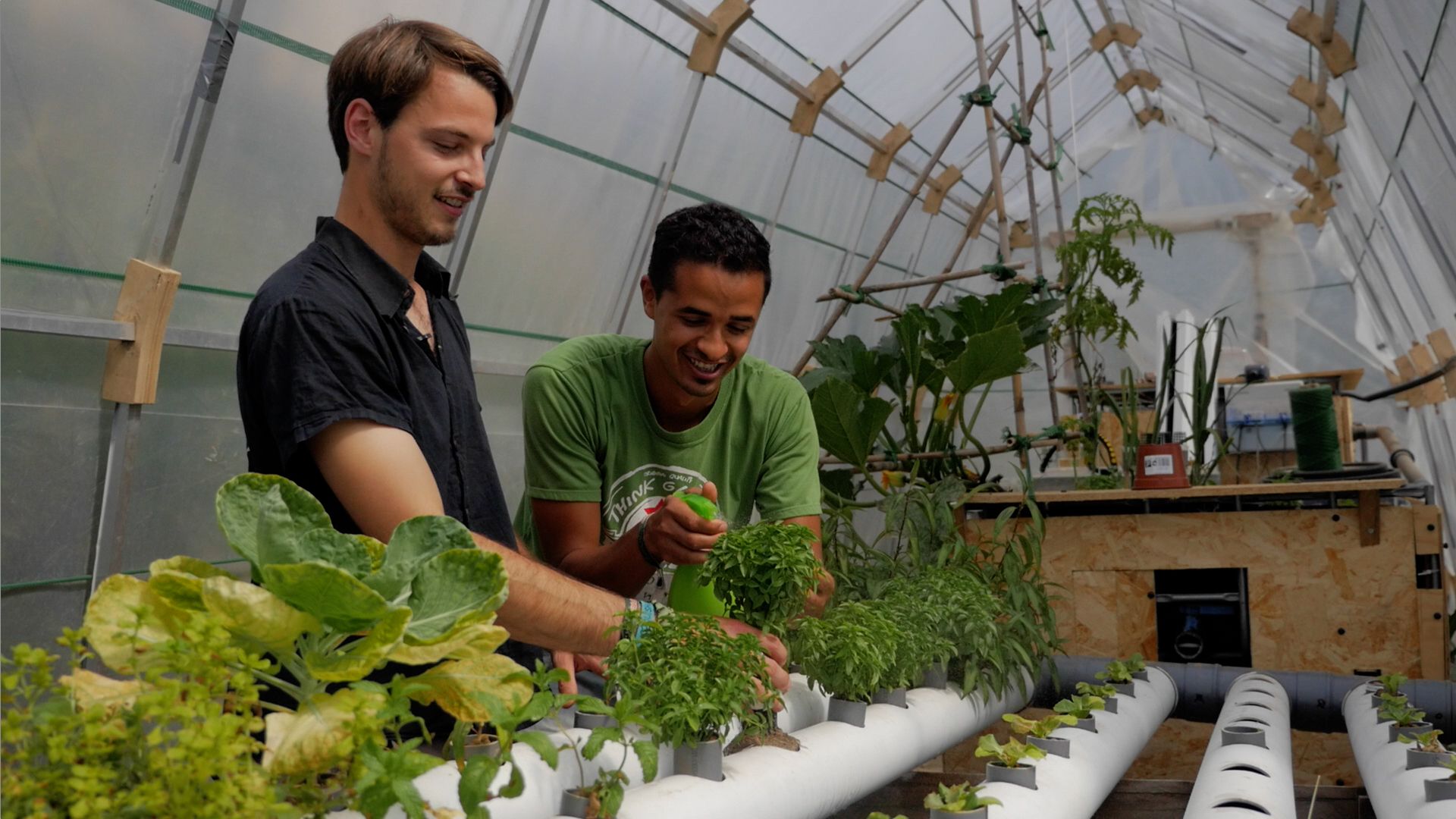
A lettuce can sprout in a plant pot full of earth or in a fish tank with only water. This latter system is what is used by the entrepreneurs of Aquapioneers, a startup that has developed an aquaponic kit in which any seed can be grown from fish excrement. While the fish fertilise the crop, the plants keep the water clean, all within a closed cycle.
It is also a system that reduces water use by 90%, that is 100% organic and that allows plants to grow twice as fast. Moreover, it allows for vertical growth, something fundamental for the project’s creators, Guillaume Teyssié and Loic Le Goueff, in cities like Barcelona where there are already a number of initiatives to promote urban agriculture.
At the same time, the plants produced by their system will never be as contaminated as those grown in earth. "People do not realise, but everything is very contaminated. If you were to see what was on harvested vegetables, you wouldn’t eat them," says Teyssié. With Aquapioneers, changing the water in the fish tank is much easier than changing earth, which means pollution is kept down.
Even though the startup has begun making these kits for homes and offices, their objective is to bring larger vegetable gardens to rooftop terraces, schools and restaurants in Barcelona. To do this, they have launched a crowdfunding campaign on Ulule, with which they hope to raise 15,000 euros to take their design to all the Fab Labs that want it and to be able to take their system to other cities. The target has already been reached, but now they have only four days to increase it to the 30,000 euros needed to do the same with the vegetable gardens.
Small, but with big aspirations
Their aim is to get their fish tanks, which are 30 centimetres wide and 80 high, into homes and offices. In some cases, the main idea is for people to have their own vegetable patch, but also for companies to have them, providing employees with another reason to enjoy their work and to help create a positive aura that Teyssié insists comes from contact with nature. On the corporate side, they already have a pilot project with Schneider Electrics.
They have built a greenhouse in Valldaura that they want to improve to make it 100% self-sufficient
In this initial recipient they recommend planting aromatic herbs, strawberries or lettuces, while the vegetable gardens can handle aubergines, courgettes or melons, something they have already done in the 25 m² space they have in the Green Fab Lab at the Institut d'Arquitectura Avançada in Valldaura. This is where the main part of their project is housed, the vegetable garden in a greenhouse that they hope to eventually install in schools. "Aquaponics is very powerful for teaching other disciplines like biology, mathematics, agriculture... and in Barcelona there are a lot of schools that are moving towards open systems, we think we can connect well with them," he says.
The three pillars of the business are: families, to whom they sell the basic kits for 850 euros; companies, especially those with more than 500 employees who have wellbeing programmes for their staff; and centres and other private agents that want vegetable gardens.

Teyssié and Le Goueff want Aquapioneers to consolidate urban agriculture | Ceded
If they reach the 30,000-euro target in the crowdfunding campaign, they also want to prove that their greenhouse can be 100% self-sufficient. As Teyssié points out, they now need power for the water and air pumps, as well as food for the fish. "With this money we want to install a system of solar panels with batteries and stop buying processed food for the fish, which in the end are like hens that, when fed with organic food, generate more quality," he says. At the same time, they also hope to gather rainwater so as to be totally independent.
Open source, the lab of innovation
Developing the design with machinery and technology from Fab Labs means they can easily export the project. This makes them see these manufacturing spaces as "a centre of innovation", according to the cofounder, who explains that in the first place where they replicated the idea, in Montevideo (Uruguay) in November, some improvements were applied. "Innovation always comes from the mix of different cultures and ways of thinking. A Fab Lab in India can improve one thing and one in Uruguay another," he argues.
"Innovation always comes from the mix of different cultures and ways of thinking"
While they see the sales to private individuals and companies as the way of monetising the project, this other side of Aquapioneers has to be understood as the way to develop the product and adapt it to the needs of each market.
All of this is still in line with their wish to remain a startup producing locally. "We do not want to make our kits outside Barcelona, which is why we are working with professionals known as digital woodworkers, who have the same machines as the Fab Labs," says Teyssié. However, always and when the request for purchase comes from a client in the Catalan capital. If the order comes from abroad, they send the design to the closest Fab Lab so as to avoid having to send materials and only information, so that it is the client who assembles his or her own kit. "Our idea is to reduce delivery costs while revitalising the local economy," he says.
The project has been underway for just over a year and, so far, has been financed with their own funds. "With the savings of the two founders," specifies the co-creator, something that he stresses has allowed them more freedom in choosing how to move forward.